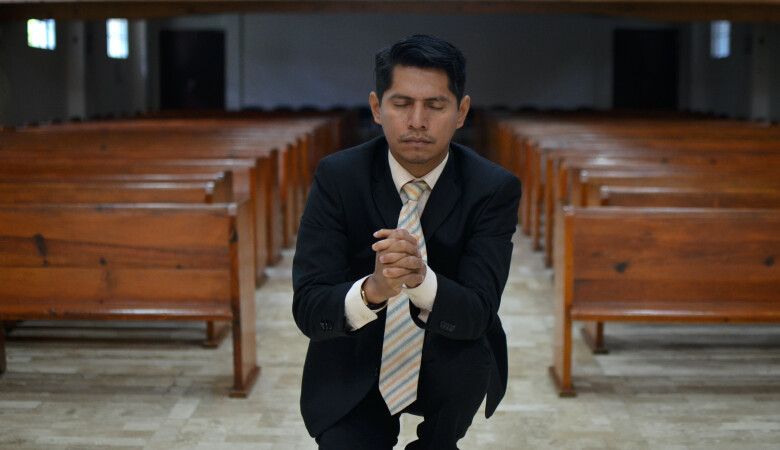Judgment Day Approaches: Noah Prepares the Ark
October 10, 1999 | Andy Davis
Genesis 6:1-22
sermon transcript
Introduction
Turn in your Bibles to Genesis chapter 6. As we continue in our series in Genesis, we're looking at today, for the first time, Noah's flood. If you were to go to any Christian bookstore and look in the children's section, I think you'd see more books on Noah and the ark than any other topic in the Bible, wouldn't you agree? There's just something that captures the imagination about this story. Because of that, and because of some... A variety of difficulties, perhaps, people may see with it, technically or scientifically, there's a temptation to begin to wonder if this really is a myth or some kind of a children's story or whether it really actually happened. You know where I come down on this? Of course, it actually happened, the Bible says so. But the fact of the matter is that the lessons in this story, which cover the next four chapters, six, seven, eight and nine, and on beyond, are so significant even to our generation that we have to heed this message. We have to understand what God says to us.
In the 20th century, there's been a tremendous amount of interest in Noah and the ark. There have been numerous expeditions to try to find the ark. I started doing some research on this, and I was amazed by the number of near-misses that people have had in trying to find the actual boat that Noah was on. Around the turn of the century, some Russian soldiers were sent on an expedition from the Tsar to the Mount Ararat region on the border with Russia, and they found what they claim to be the remains of Noah's Ark. There's some grainy black and white photos that they're showing on American TV these days, I don't know if you've seen this show recently, talking about the Tsar's expedition, but they failed to prove conclusively that they found Noah's ark. In 1955, French industrialist Navarra led a high-priced expedition to the same region, and he discovered a dark form of a ship under an ice cap, and he was convinced... This was at 13,500 feet up the mountain, he was convinced his was Noah's ark. He managed to extract a piece of wood and bring it back to some labs for testing. The variety of tests that it was subjected to, fossilization tests, carbon-14 dating, and other things, were inconclusive.
Some of the tests seemed to show that the wood was from 5000 BC, that it was made out of oak, and that it had been worked with iron tools, but the carbon-14 test showed that it was about 8th century AD. Again, inconclusive. Following a report from some Turkish airman in the Air Force of Turkey, Life Magazine sent an expedition on September 5th, 1960. They published a story with an article and a photo of what they thought was an ark. It turned out merely to have been a freak of nature, a clay push-up from a lava flow, but just looked like the ark from the air. This one's my favorite. On February 21st, 1974, Senator Frank Moss of Utah stood up on the Senate floor of the United States Congress and announced that a satellite photo of Mount Ararat had shown that the ark was up there. They analyzed the photo and it proved to be totally inconclusive, and it was rejected later on. In 1974, a group from Palestine, Texas, the same year, claimed to have seen the ark from a distance of 2000 feet, but the photo they produced had definitely been retouched, the CIA approved that. So where does all this lead? Doesn't it leave you with questions? Is the ark really there?
I think it's all very interesting. I don't know why people would spend so much money to find it. God is not in the habit of leaving physical artifacts around. He just doesn't tend to do it. Same thing with the actual physical cross of Jesus Christ. But even if the ark were up there, what would it prove? I think it would prove, perhaps, that the story was true, but do you think that that would lead people into faith in Jesus Christ? Jesus did miracles right in front of people and they found some other explanation. They saw Lazarus rise from the tomb, and they're thinking of something that they could say of how a guy could be in the tomb for four days, maybe you had a food supply or some kind of air supply in there, and he wasn't really dead. They're always going to question. I think the heart of the expeditions is true, namely, that we take our faith, the historical nature of our faith very seriously, and that we do believe that there was actually physically an ark. This is not a children's story, and it is not a myth. It really is, more than anything, a warning to a sinful generation. For Jesus says, “as it was in the days of Noah, so it will be at the coming of the Son of Man.” From the days before the flood, people were eating and drinking, marrying and giving in marriage, up to the day Noah entered the ark, and they paid no attention, and had no idea of what would happen until the flood came and took them all away. So this story, however interesting it is to us, scientifically, however many questions we bring to it, ultimately, is a warning of judgment from a holy God who does not want his world polluted by sinfulness.
Let's read Genesis 6:1-22, and let's look at what God would have to say to us from it. Chapter 6, verse 1, "When men began to increase in number on the Earth and daughters were born to them, the sons of God saw that the daughters of men were beautiful and they married any of them they chose. Then the Lord said, 'My spirit will not contend with man forever, for he is mortal. His days will be 120 years.' The Nephilim were on the Earth in those days, and also afterward, when the sons of God went to the daughters of men and had children by them. They were the heroes of old, men of renown. The Lord saw how great man's wickedness on the Earth had become, and that every inclination of the thoughts of his heart was only evil all the time. The Lord was grieved that he had made man on the earth, and his heart was filled with pain. So the Lord said, 'I will wipe mankind, whom I have created from the face of the Earth, man and animals and creatures that move along the ground and birds of the air, for I am grieved that I have made them.' But Noah found favor in the eyes of the Lord. This is the account of Noah. Noah was a righteous man, blameless among the people of his time, and he walked with God. Noah had three sons, Shem, Ham, and Japheth. Now, the Earth was corrupt in God's sight and was full of violence. God saw how corrupt the Earth had become, for all the people on Earth had corrupted their ways. So God said to Noah, 'I am going to put an end to all people, for the Earth is filled with violence because of them. I am surely going to destroy both them and the Earth. So make for yourself an ark of cypress wood, make rooms in it and coat it with pitch inside and out. This is how you are to build it. The ark is to be 450 feet long, 75 feet wide and 45 feet high. Make a roof for it, and finish the ark to within 18 inches of the top. Put a door in the side of the ark and make lower, middle and upper decks. I'm going to bring floodwaters on the Earth to destroy all life under the heavens. Every creature that has the breath of life in it, everything on Earth will perish. But I will establish my covenant with you, and you will enter the ark, you and your sons, and your wife, and your sons' wives with you. "You are to bring into the ark two of all living creatures, male and female, to keep them alive with you. Two of every kind of bird, of every kind of animal, and of every kind of creature that moves along the ground will come to you to be kept alive. You are to take every kind of food that is to be eaten and stored away as food for you and for them. Noah did everything just as God commanded him."
Rebellion on Earth, Judgment Day is Coming
In verses 1-4, we come to an interesting little passage that has been interpreted a variety of ways, and it's a little bit difficult to get all the details right and to understand what God is saying to us here. But as we look at this, we begin to understand that the issue in verses 1-4 is the spread of rebellion on the Earth. In verses 1-4, it talks about these sons of God, and it says when the sons of God saw that the daughters of men were beautiful, they took of them any that they chose, and they married them and they had children by them. It’s very difficult to try to understand who these sons of God were. The standard answer comes from the Book of Job. In Job chapter 1:6, it says, "One day, the sons of God came to present themselves before the Lord and Satan also came with them." Also chapter 2, verse 1 says, "On another day, the sons of God came to present themselves before the Lord, and Satan also came with them to present himself before him." The interpretation of Job 1 and 2 is that the sons of God are angels. It's a little debatable whether they are angels in Job 1 and 2, but it brings us into an immediate problem here, in Genesis 6. If the sons of God are angels, and this is how it goes, if they are fallen angels, the idea is that, as fallen angels, they came and somehow had relations with human women, they saw that they were attractive, and in these relations, they produced a kind of a super race of warriors called the Nephilim. In verse 4, “The Nephilim were on the Earth in those days, and also afterward, when the sons of God went to the daughters of men and had children by them. They were heroes of old, men of renown.” Scholars bring in data from the Book of Jude. In Jude, verse 6 and 7, it says, "And the angels who did not keep their positions of authority but abandoned their own home, these he has kept in darkness, bound with everlasting chains for judgment on the great day." And then the very next verse, in verse 7, in Jude, it says, "In a similar way, Sodom and Gomorrah gave themselves up to sexual immorality and perversion." So they put those two verses together and say that the angels left their habitation or their place of rightful authority and came and had sexual relations with women, and in this way, they produced some kind of a supernaturally-endowed race of warriors called the Nephilim.
This same concept is found in Greek mythology. For example, Hercules apparently was the product of the god Zeus and a human mother, and he had tremendous power because his father was Zeus. So this was an old idea, as old as the Greek mythology, but there are problems with the standard view. The first of all is that angels have no bodies, so how could their offspring even exist? Second of all, why would they be of any supernatural power? If, for example, you said, "Well, the demons took over a human body and then they had children by them," there's still no reason why there would be some kind of super race coming out of this. I think there's another possibility. In Luke Chapter 3, for example, in the genealogy, Luke runs from Jesus' day back up through Seth and Adam, up to God, and he says that Seth was the son of Adam, and Adam was the son of God. So Adam, just a human being, was called the Son of God, and that he was created in the image of God. It could be that these are just human beings, and I think it reads more naturally that way. Furthermore, if you look at the flow from Genesis 4, skipping over chapter 5 into chapter 6, at the end of chapter 4, we have this man Lamech. Lamech, an evil tyrant king, was boastful and prideful, and killed somebody for just wounding him, and then boasted about it. Lamech's other sin was bigamy. He took two wives. In this way, he broke the pattern that God had said, of one man and one woman, one flesh union, for all time. He had two wives, and I think it just degenerated from there. In chapter 6, we've got sons of God, perhaps they were even of the godly line of Seth. Some scholars say that there were sons of God and that they were in Seth's line, that they became corrupt, and that they looked around and they took any woman they wanted. It wasn't just a matter of bigamy at this point, but of polygamy, of taking any wife they wanted. They did what they pleased. They were ruled by their lust and by their power, and did anything that they wanted, whatsoever. They married any of the women they chose. This perhaps would be the origin of the idea of a harem, namely a group of women kept only for the tyrant king or the leader king. But I don't want to go too far beyond what the Scripture says. It just seems to be that God is offended by the fact that they took any of the women that they chose, and so it says in verse 3, "The Lord said, 'My spirit will not contend with man forever, for he is mortal, his days will be 120 years.'"
In verse 4, it mentions the Nephilim who are on the Earth in those days, and afterward. Who are these Nephilim? They are translated in the King James version as giants, powerful beings, mighty warriors. We meet them again in Numbers 13:33, in which it says that the Anakites, who were living in the land of Canaan, were descended from the Nephilim. Here, in verse 4, it says, "In those days and afterward, we have the Nephilim." They are these powerful warriors who are able to conquer, and they're also physically large, they were huge. You remember when the spies came back, they were terrified of the Anakites, the descendant of the Nephilim, and they said, "The people are strong and tall Anakites," and they were afraid to take over the Promised Land because of these powerful Anakites. Og, king of Bashan, who they conquered, was an Anakite, and his bed was 13 feet long and nine feet wide. Some people think that Goliath may have been an Anakite, descended also from the Nephilim for he was nine feet tall. These are powerful beings. But in verse 4, we also get an indication of what motivates them. It doesn't come across in the NIV very well, but at the very end, it says, "These were the heroes of old, men of renown." The Hebrew actually says that they were “men of the name.” In other words, they sought to make a name for themselves. They were in it for their own glory. We meet this attitude again in Genesis 11:4, with the building of the Tower of Babel. It says "Come let us build a city with a tower that reaches to the heavens so that we may make a name for ourselves." Did you notice that? "Make a name for ourselves and not be scattered over the face of the whole Earth." These powerful warriors were seeking to make a name for themselves. I really look on them as tyrant kings who had no respect whatsoever for laws, they dominated the people under them, they were violent, they took any woman they wanted, and they were dominating the Earth at that time. So God's response at this point is judgment, and He gives a timetable for the judgment. In Genesis 6: 3, "My spirit will not contend with man forever." There's a sense that God, by his spirit, is wrestling with us and our sin.
Do you ever feel like that? That God's Holy Spirit is wrestling against your sin nature? Well, if you don't, you're not a child of God. That's exactly what the Holy Spirit does, He comes in and He begins to wrestle against your sin nature, but He also wrestles or contends against the flow or the development of wickedness in a society, and He's saying, "I can't wrestle or contend with man forever, for he is mortal. His days will be 120 years." I interpret this to mean that God started a clock ticking at that moment, 120 years to repent, and when that 120 years was over, judgment would come. God sets a timetable. We don't always know what it is, but there is a timetable, and there is an opportunity for repentance. Every day that the sun comes up and it's just another day, just like all the other days, that's evidence of God's graciousness to us and his desire to wait and to be patient so that we will repent. God measures out this repentance, He measures out the sin, how much He will tolerate. He says to Abraham in Genesis 15:16, talking about the Promised Land, "This land will be yours but not yet, not yet." In Genesis 15:16, He says, "In the fourth generation, your descendants will come back here, for the sin of the Amorites has not yet reached its full measure." Isn't that interesting? The Amorites were among those that were kicked out by Joshua in the Promised Land. When their sin had reached full measure, they fell like ripened fruit into the basket of God's judgment. When the time had come, when the sin was complete, they fell. We don't always know what that is, but we know that God is patient. God is not slow, He's not waiting. Some people who are righteous look at America or look at other nations, and they say, "God, why are you withholding judgment? Why is it that you tolerate evil?" Habakkuk asked that question, “Why?” 2 Peter 3:9 says, "The Lord is not slow in keeping his promise, as some understand slowness. He is patient with us, not wanting anyone to perish, but everyone to come to repentance.” Romans 2:4 is an important verse on this topic. It asked the question, “Do you show contempt for the riches of his kindness, tolerance and patience, not realizing that God's kindness leads you toward repentance?” You see, God gives us an opportunity, He gives us time, and here, to this ancient world, He gave them 120 years. The clock started ticking.
I heard a great story about the patience of God. About 100 years ago, there was a traveling speaker who was an atheist. He went from place to place, and he was going around in the churches of Scotland, and he liked to blaspheme God, he liked to put God to the test, so to speak, and he had a whole humorous kind of blasphemous talk. When he got done, he would take his pocket watch out of his vest and he would say, "I'm going to give God three minutes to strike me dead for all the blasphemies I've uttered just today. I'm going to give him three minutes." So he'd take the watch and he'd kinda hang it over there, and he'd wait for three minutes. It was very dramatic. Can you imagine? As we wait for those three minutes. At the end of the three minutes, he'd pick up his watch and he'd close it with a snap, and then he'd look over to whoever was debating him, and he'd say, "It's your turn." So, one elderly pastor got up and just smiled and shook his head, and he said, "And did my esteemed colleague think that he could really exhaust the patience of the eternal God in three minutes?" You see? He missed the point. That guy was kept alive every day so that he would have an opportunity to repent. God is patient, but there is a limit to it. Nineveh had 40 days to repent, and they did. They made the most of that time, didn't they? They did repent. King Nebuchadnezzar was given a year. He wasn't told that he was given a year, but Daniel warned him, he had a year. At the end of the year, he did not repent, he wasted his time, and God judged him, turned his mind into that of an animal, as you remember. King Herod, his time ran out right away. When he blasphemed, the time was over and he was struck at that moment by an angel of the Lord. We don't know how long the time is, but we know that when the sun comes up, God has been patient with us and has given us another opportunity to repent.
But God knows that they're not going to repent. He knows very well that He's going to bring a flood. In verses 5 - 7, we see God's resolution. It says that the Lord had seen how great man's wickedness on the Earth had become. I read in the newspaper two days ago, somebody wrote about Noah's flood, only touched on it lightly. This is in the same spirit of that atheist I was just talking to you about. He talked about God's irritability in the Old Testament - he’s an irritable being, you know, bringing the flood on. God is not an irritable being, He's a holy being, and He's patient too, but He's holy. He saw that man's actions had become wicked on the Earth. They were acting out evil on this beautiful stage which God had created for good, this beautiful world, and all they were doing was acting with evil. It does not say what the evil was, perhaps murder, adultery, idolatry, who knows what but the same sins that Satan has always been tempting us with. I think violence was a big issue. In verse 11, it says, "Now the Earth was corrupt in God's sight and full of violence," so that at least we know is involved. But there is... I think the key issue here is there's an escalation of sin, it's getting worse and worse all the time in action, but even worse was God's looking at their heart. He was searching their hearts, and He saw that there was nothing but evil in their hearts all the time. The heart of man was desperately wicked, and beyond help. All of their creative powers of intellect, their ability to plan and to reason, to work things out and to invent were given over wholly to evil, and that was the situation. Nothing good was going to come of it. Make a tree good and its fruit will be good. Make a tree bad and its fruit will be bad. These were bad trees. Their hearts were evil, and nothing good would come.
The Greek ideal of God is that he is a passionless being, no emotions, just pure intellect and power, but our God is not that way. Our God is an emotional being. Our emotions come because we're created in his image. Jesus was an emotional being. If you ever want to study something fascinating, look at the emotional life of Jesus, the different ways that He showed emotion in his life. God is emotional; He is not passionless about what's happened to the Earth. He is deeply grieved. God rejoices over the repentance of one sinner, but He's deeply grieved over such sin. It says, in Ephesians 4:30, "Do not grieve the Holy Spirit of God with whom you are sealed for the day of redemption." God is grieved, pained by human evil. In verse 6, in some translations, it says that God repented that he had made man on the Earth. Have you ever troubled yourself over this, the repentance of God? First of all, understand that God is accommodating himself to our language so that we can understand him. Let me tell you what this does not mean. It does not mean that new information came to God that He didn't have before. Nothing new came to God so that He didn't understand it, and now that He sees how bad it is, then He repented from having made man on the Earth. It's not like that. Nor could it be that there was some kind of change in God's character, whereas, before, He was tolerant, now He's changed, and now He's not going to be tolerant anymore. There's no change in God, and there's no lack of information in God. It's just that He's trying to explain to us just how much this grieved him, that sin had reached this level. God's pain over sin would ultimately lead him right to the cross. He would feel that grief, that pain over sin, physically, in the person of his Son, Jesus Christ. That's a measurement of how God feels about sin.
God makes a holy resolution in verse 7, He's going to wipe out all human beings from the face of the Earth. It's a settled decree of God, nothing can change his mind. God's holiness is going to lash out and mankind will be wiped out. In the Hebrew it’s a sense of the wiping of a dish, a thorough cleaning or a thorough cleansing. It's used again in 2 Kings 21:19, when God says, "I will wipe out Jerusalem as one wipes a dish, wiping it and turning it upside down. It's gonna be thoroughly cleansed." Think of the flood as the cleansing of the Earth, and that's really what it was, God is going to wipe away all the evil. He's going to cleanse it and He's going to start over. That's, in effect, what He's doing. There would be, because of this flood and because of its universal nature, no place to hide. In the same way, it's going to be when the Lord returns on judgment day, there will be no place to hide. Revelation 6 talks about this, "Then the kings of the Earth, the princes, the generals, the rich, the mighty, and every slave and every free man hid in caves and among the rocks of the mountains. They called to the mountains and the rocks, 'Fall on us, and hide us from the face of him who sits on the throne and from the Lamb, for the great day of their wrath has come, and who can stand?'" There's no place to hide when God's judgment comes. Though they look for it, the water will find them out. It is a settled decree from God that He's going to cleanse the Earth entirely. Also, it's including living creatures, animals that breathe the air through their nostrils, that live on dry land, and birds as well. You may ask why? This hardly seems fair, but understand that God had created the Earth and placed it under our authority, and so the judgment that came on us also came on the animals and on all those that had been created and placed under our authority.
The Ark: Provision for the Righteous in the Day of Judgment
But God was going to provide protection and provision for some of them to make it through the flood. So, in verses 9-22, we see God's righteous instruments, namely Noah and his ark. Now, here we meet Noah. We met him a little bit in chapter 5, but now we're really going to get to know Noah. Noah was a righteous man. Remember that Elijah complained, at one point, that he alone was left. He was the only one on the face of the Earth that was righteous and worshipped Yahweh, the God of Israel, and God said, “ Not so, for I have reserved for myself 7000 who have not bowed the knee to Baal." In Noah's case, he was alone, he and his household. There was no one else righteous, for God does not sweep away the righteous and the wicked alike. Noah and his household were alone, righteous. Verse 8 says that Noah found favor in the eyes of the Lord. The word “favor” literally means “grace,” that Noah found grace in the eyes of the Lord. Noah was a sinner, just like you and me, but he was an obedient, righteous man, despite his sin nature. All of us are saved by grace, and in verse 8, when it says that Noah found grace in the eyes of the Lord, it meant that God saw Noah's sin, he understood, and yet he forgave him through the blood of Jesus Christ. God was able to look ahead to the sacrifice of his son Jesus and cleanse Noah from his sin, and yet, through all of that, Noah was a righteous, obedient man in his generation. When it says that he was blameless, it doesn't mean that he was literally perfect. It just meant that there was no area of his life that wasn't surrendered over to the authority of God. He wasn't holding anything back. He was willing to do anything that God called him to do, and he was blameless in his generation. It was like he was a salmon swimming upstream, a flood of mountain water flowing down in a white water river, and he was going upstream, fighting at every step of the way, surrounded every day by ungodly neighbors, by mockers and scoffers, yet, he lived a righteous life, because he walked with God. “Walked with God.” Who else was it who walked with God? It was Enoch. Enoch was Noah's great-grandfather, maybe something had been passed down, he walked with God daily, moment by moment, in obedience to the commands of God, in fellowship with him. It's such a contrast with what we've seen in verse 5, where they are only, all the time, thinking about evil. He's only, all the time, thinking, "What does God want me to do? How can I obey God?"
Now, it happened, in the providence of God, that he was the father of three sons, and there's some practical considerations here, aren't there? How would you like to have built an ark by yourself at age 500? He had three sons to help him, so there's some practical help for building the ark. But even more significant would be the role that they would play in the repopulation of the Earth, the spreading of the Earth with their descendants. Furthermore, there was the care of the animals on the ark. There's some details to that that we should consider, but there's a great deal of work involved, and so he had the help from his sons and their wives in his own life.
In verse 11 and 12, we see that the sin progresses. The time is being wasted. The time for repentance is not being used. The sin continues and deepens. The corruption on the Earth implies total ruin, morally. The world has become useless and defiled, destroyed. And it's universal sin. It covers the Earth. In verse 12, all human beings had corrupted their ways, and God saw it all, nothing escapes his attention. Do you ever wonder about God searching the hearts, understanding them, and yet, through his purity and his holiness, He has to gaze on this? Habakkuk 1:13 says of God, "Your eyes are too pure to look on evil. You cannot tolerate wrong." God was gazing at this, day after day, and God finally lets Noah in on what He's going to do. Verse 13 says, "So God said to Noah…” That's a key moment. God's regular pattern is communicating his intentions to his people. They know what's coming, the rest of the people don’t. Amos 3:7 says, "Surely the sovereign Lord does nothing without revealing his plan to his servants, the prophets." Right before God was about to destroy Sodom and Gomorrah, He said, in himself, "Shall I hide from Abraham what I'm about to do?" The answer is no, He wanted to let Abraham know what He was about to do. He does the same thing with Noah, He lets him in on his plan.
God's salvation plan was an ark of cypress wood, or in the King James version, it calls it gopher wood. Some scholars say that gopher wood is really cypress wood. It grew in abundance there and it would have been good for building ships. Don't God's ways seem foolish sometimes? What an odd thing. Couldn't He have brought Noah and all them to some island somewhere, and inundated the rest? No, God has his ways and He has his reasons. Even though the means of salvation may seem strange or bizarre or even worthy of mockery to the world, yet they are still God's ways, and God's ways, though it seemed foolish to the world, are pure wisdom. The world's ways, though it seems wise to them, are pure foolishness to God. He chooses an ark and He chooses one man and his family to build the ark. "Make for yourself an ark of cypress wood, make rooms in it, coat it with pitch. It's going to be 450 feet long, 75 feet wide, 45 feet high. This week, I'm only concentrating on the spiritual side. Next week, and over the next few weeks, we're going to look at some of the practical issues, the scientific approach. Was the ark big enough? What about the fossils? What about the dinosaurs? All those wonderful questions. I'm hoping to cover all of your questions. But this time, I want to concentrate totally on the spiritual side, and that is that God's ways seem foolish to us. A tremendous amount of labor would be involved in building the ark. I can't even count the number of cypress trees that would have had to be cut down and claimed and curved and prepared to build this ark. The amount of labor would have crushed any normal person, even with three helpers, but God gave him energy and strength as, year after year, they prepared that ark and built it and got it ready. Noah might question, why an ark? Why do you want me to build an ark, God? God tells him, "I'm going to bring floodwaters on the Earth to destroy all life under the heavens, every creature that has the breath of life, and the ark is going to save your life, and it's going to save the life of your family." That's all Noah needs to hear. He gets ready, he gets busy.
God made a covenant with Noah that He would protect him, a covenant to bring Noah out of the destruction. We see it fulfilled in chapter 9, when God makes a covenant not just with Noah, but with the whole Earth. The Lord knows. 2 Peter 2:9 says, "The Lord knows how to rescue godly men from trials, while to hold the ungodly for the day of judgment and continuing their punishment." God knows how to separate the righteous from the wicked and to protect the righteous. Your salvation depends on God's careful separation that way. God knows how to protect you from judgment. It says so in Romans chapter 5, “If when we were God's enemies, we are reconciled to him through the blood of his son, how much more, having been reconciled, shall we be saved from God's wrath through him?” We're counting on that, aren't we? That, on the day of wrath, we will be protected, and God knows how to protect us. It says in verse 22, that Noah obeyed everything that God told him to do, and that was key to his salvation. Suppose Noah had been a disobedient procrastinator. Suppose Noah said, "I've got 120 years. I'm going to put it off." First of all, I don't know that God revealed 120 years, He just said, "Get busy and build that ark." It says in Hebrews 11:7, "By faith, Noah, when warned about things not yet seen in holy fear, built an ark to save his family." Every day he got up to save his family, he worked on the ark, and he built it. Noah's faith prompted immediate obedience. God does not lie. His words don't fall to the ground as light things.
When God says, judgment is coming, it's coming. Absolutely. It doesn't matter that we don't see any indication around here. It doesn't matter, as in chapter 3 of 2 Peter. It's a parallel account of this, in terms of the end of the world. Jesus said, "As it was in the days of Noah, so it will be at the coming of the Son of Man." People say, "Where is this Coming he promised?" Ever since our Father died, everything goes on as it has since the beginning of creation. It's the exact same way now, but it doesn't matter. If God says that judgment is coming, it's coming, and so Noah got busy and he built that art. But it wasn't all that he did. In 2 Peter 2:5, Noah is called a preacher of righteousness. What that meant was, while he was working on the ark, just like Nehemiah with the walls, he was busy doing something else. He was preaching the Gospel. He was saying, "Repent. Come on the ark, there's room for you." If you'll just turn from your sin, if you enter the ark, you'll be protected. He preached, but they mocked and they scoffed and they would not listen, and in the end, they were swept away with the floodwaters.
Application
As we come to understand Genesis 6 and to apply it, it's just a simple application. I guess, spiritually, it's simply this, are you on the ark or are you still outside? Have you come to the place of safety and security? Because God's judgment is coming. He said it definitely is coming. No one knows about that day or hour, not even the angels in heaven, nor the Son, but only the Father. As it was in the days of Noah, so it will be at the coming of the Son of Man. From the days before the flood, people were eating and drinking, marrying and giving in marriage, right up to the day Noah entered the ark, and they did not know what would happen until the flood came and swept them away. Why didn't they know? They didn't listen to the preaching. They didn't listen to what Noah said. They didn't take it to heart. So I just simply want to ask you, you've come today to worship. Are you on the ark? Have you given your life to Christ?
Jesus Christ is the ark of safety for the coming flood of God's wrath. It's the only place, the only safe place. Imagine a world covered totally with water. There's only one place of safety, the ark. There's only one place of safety from the coming judgment, and that is the blood of Jesus Christ. Come into faith in him. If you're on the ark, let me ask you a question, are you a preacher of righteousness? And do you live up to what you preach? This world around us needs to hear this message, doesn't it? And God has committed to us the ministry of reconciliation, just as he committed to Noah the ark-building and the preaching. Are you being faithful to preach the message of righteousness and to live up to it? This world is facing a judgment such as it cannot comprehend, and God will not give us another warning. He's already told us that we don't know the day or the hour, and that it will certainly come. We don't need any more information. We just need to be busy doing the work of God as He has called us. Friend, if you have not given your life to Christ, come today.






























